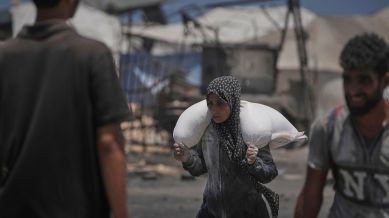Stay updated with the latest - Click here to follow us on Instagram
‘People in Gaza are walking corpses’: UN warns as famine deepens
As the World Health Organisation calls the starvation “man-made,” pressure grows on Israel’s government—externally and internally—to end the crisis before more lives are lost.

The head of the UN agency for Palestinian refugees has warned that the humanitarian system in Gaza is on the verge of collapse, as starvation grips the besieged enclave and even aid workers begin to faint from hunger.
“People in Gaza are neither dead nor alive, they are walking corpses,” said Philippe Lazzarini, Commissioner-General of the United Nations Relief and Works Agency (UNRWA), in a post on X. At least 113 people have died of hunger, including 45 in the past four days.
monthly limit of free stories.
with an Express account.
“This deepening crisis is affecting everyone, including those trying to save lives … When caretakers cannot find enough to eat, the entire humanitarian system is collapsing,” Lazzarini said.
UNRWA says it has around 6,000 truckloads of food and medical supplies waiting in Jordan and Egypt, but Israeli restrictions have blocked most aid from entering Gaza. Lazzarini urged Israel to allow “unrestricted and uninterrupted” humanitarian access.
As international pressure mounts, Hamas submitted a revised ceasefire proposal to mediators. An Israeli official reportedly called it “workable.” Talks are set to continue in Sardinia with officials from the US, Israel, and Qatar.
The proposed deal includes a 60-day ceasefire, during which Hamas would release 10 hostages and return the remains of 18 others in exchange for Palestinian prisoners. It also calls for expanded humanitarian access, a restoration of the UN aid system, and discussions on a permanent end to the war.
But despite the progress, Israel continues to bombard central Gaza, killing at least 89 people in the past 24 hours, according to Gaza health officials. Israeli negotiators have returned from Doha for internal consultations, with key sticking points remaining—especially over troop withdrawals and the future of the UN aid distribution system.
Since March, Israel has effectively blocked UN-led aid operations, accusing Hamas of diverting supplies—a claim disputed by aid agencies. In its place, Israel allows limited distribution through the Gaza Humanitarian Foundation (GHF), a private US firm that operates with a militarised model. The system has been widely condemned, with over 1,000 people reportedly killed while trying to access aid in the past two months.
Protests in Tel Aviv have erupted, with demonstrators carrying sacks of flour and photos of starving Palestinian children, demanding an end to the blockade.
As the World Health Organisation calls the starvation “man-made,” pressure grows on Israel’s government—externally and internally—to end the crisis before more lives are lost.